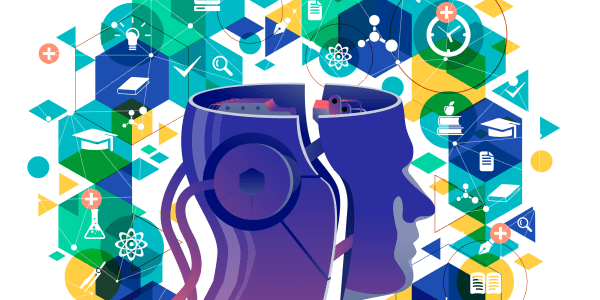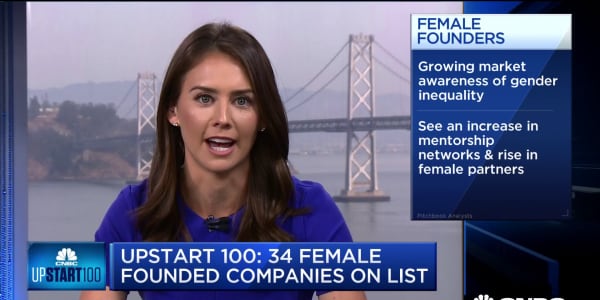Nearly half of Americans say they are impacted by poor-quality sleep, and many are on the hunt for solutions to help them get to sleep more quickly and stay asleep longer.
CEO Michael Kisch is among a growing group of entrepreneurs making tools to improve people's sleep. His company, Beddr, is known for its stamp-size sensor called the Sleep Tuner, which fits on the forehead and measures things like heart rate and oxygen saturation levels. His team also built an app that offers access to coaches, who can help people making lifestyle changes to improve their sleep quality, and provides a network of medical experts for those who need follow-up care.
Kisch launched his Mountain View, California-based company in 2016 after experiencing his own sleep struggles. "It was the primary contributor to some very dark days where I struggled with my mental well-being, relationships and physical health," he said.
Now the company — which made the 2019 CNBC Upstart 100 list, revealed on Tuesday — is making its most ambitious move yet: to get regulatory approval to detect sleep apnea, which would make Beddr a much easier alternative for detecting this common condition than the current method, which requires sleeping in a lab while hooked up to wires.
An estimated 22 million Americans have sleep apnea, but about 80% are unaware they have it. The condition is associated with an increased risk of cardiovascular disease, obesity and diabetes, and those who aren't getting treatment often feel fatigued during the day despite getting a full night's sleep.
"Most people don't realize there are doctors out there who are specialized around sleep and that there are treatment options available," the serial health tech entrepreneur said. "We're looking to change that with a focus on accessibility and convenience."
So far the company has raised $5.6 million from Stanford StartX, Three Leaf Ventures, Delta Dental, IT Farm and angel investors and family offices, Kisch said.
A boom in sleep wellness tools
Beddr is far from the only company specializing in sleep.
Once a niche space, the category of sleep solutions has exploded in recent years in the form of coaching apps, wearables and accessories that are designed to fit on the bed or "smart" mattress. Media executive Arianna Huffington is a particularly vocal proponent of the value of sleep and how it affects daily productivity.
In 2017 McKinsey estimated the sleep-health industry to be valued at between $30 billion and $40 billion and noted that the sector has grown by more than 8% per year. Studies show that some 50 million to 70 million Americans have insomnia, and many don't have access to effective treatments.
Many of these companies are pitching themselves as wellness hacks, meaning they're not regulated, while others are building medical devices and other interventions to help people improve their sleep.
More from Upstart 100:
Ahead of 2020 presidential election, this start-up is using military-grade AI to stamp out fake news
How railroads are keeping trains safe from hackers
This start-up aims to break internet monopolies and deliver 5G broadband for $49 a month
In the wellness category, a new breed of wearable devices lets users learn how well they sleep and correlates the results with behaviors that might interrupt sleep, like drinking coffee late in the day or bringing a smartphone into bed. Two of the most popular devices in this space include the Oura health-tracking ring and the Whoop wrist-worn wearable device.
On the intervention side, Fitbit is also working on detecting sleep apnea. Verily, Alphabet's life sciences arm, is partnering with medical device maker ResMed on its own sleep technology product, which is likely to also include a system to detect sleep apnea. Apple, which bought sleep tech company Beddit, may also make a move in the space.
Kisch's company sits somewhere in the middle. He's working on so-called "wellness" tools for consumers who struggle with sleep — namely, the coaching, which he's increasingly pitching to large employers as a benefit for their workers. But he's also working with regulators on the accessory that he hopes will detect the telltale signs of sleep apnea, such as interrupted breathing. From there, Kisch says the company's network of sleep medicine doctors, which it contracts with, could step in to make a formal diagnosis and recommend a course of treatment.
Most people don't realize there are doctors out there who are specialized around sleep and that there are treatment options available.Michael Kischfounder and CEO, Beddr
Kisch said there aren't any peer-reviewed studies that show whether the Beddr approach is effective in helping people sleep, although research shows that the methodology underlying the coaching — known as CBT-I — can work well for many patients with insomnia.
But sleep medicine experts warn that wearables and apps aren't a quick fix for everyone, claiming that the products are of mixed quality and many of them don't help their users sleep better. In fact, some are having the opposite effect.
"People spent billions on weight loss and increasingly sleep tech, but they don't listen to the free advice," said Seema Khosla, a pulmonologist in Fargo, North Dakota, who runs the tech committee of the American Academy of Sleep Medicine. "You don't need a gadget to tell you to put your phone down and go to bed at the same time and wake up at the same time."
Researchers are also finding out about a potential consequence of sleep tracking, known as orthosomnia, which involves patients becoming obsessed with optimizing their sleep, which in turn impacts their sleep. In other words, if someone is anxious about their sleep, getting them to fixate on it is far from ideal.

For his part, Kisch believes that just tracking sleep with a wearable or app is a "largely pointless exercise with a diminishing return."
He noted that his Sleep Tuner product is designed to be used for a set period of time rather than for nightly tracking. That's a similar approach taken by another app in the space, Big Health, which has found some resistance from venture capital with its mission to cure people of their insomnia by helping them manage anxiety, meaning many of them won't always be reliant on the app for more than a few months.
"Likewise, our wearable is not intended to be worn persistently," Kisch explained. "And the reason we built in coaching to the app is because behavioral change is more than providing data and it's hard."
Khosla, who has personally tried out dozens of apps and devices, said there's some "solid stuff" out there for users who are willing to experiment. She said some of her patients are getting a lot of use from Ebb, a device that provides a cooling of the forehead to ease the transition into sleep, and she personally likes the way that Oura presents data. She's also intrigued by Fitbit's plans in the space.
Ultimately, her group, the American Academy of Sleep Medicine, is hoping to build a website to help consumers figure out which technologies are most validated by research. "We owe that to patients to make sure these apps have some real data behind it and it's not just the next cool, shiny thing," she said.
Follow @CNBCtech on Twitter for the latest tech industry news.






